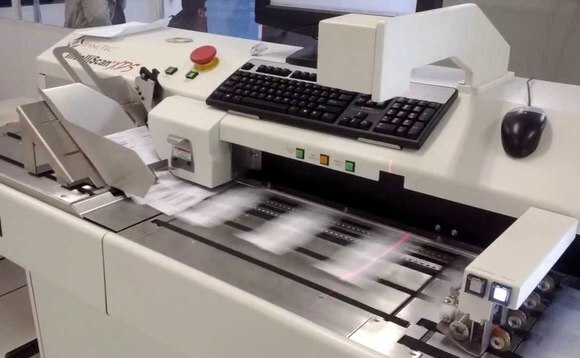
Portfolio: J-Star and Primagest

Primagest is a long-standing leader in Japan's document-scanning industry, but it faces challenges in terms of a transition in leadership and staying relevant as technology evolves. J-Star is providing support
Despite its reputation as one of the most technologically advanced countries in the developed world, Japan is a society that still prefers to work with paper when doing business - whether it's recording data, writing out applications, or for business communications.
Statistics released by Pulp & Paper International (PPI) show that in 2013, Japan was the second largest per capita consumer of paper in the world after the US at 215 kilograms. Meanwhile, the Japan Paper Association reveals that of the 14.6 million tons of paper produced in the country for domestic use this year, 8.6 million tons went into printing and communication.
Where there is a wealth of information being recorded and transmitted on paper, there is often a need for that information to be converted to data - and to that end companies like Japan's Primagest provide a vital service.
For years, Primagest's primary business has been the design and construction of high-speed scanners, plus accompanying optical character recognition (OCR) and intelligent character recognition (ICR) software, needed to perform this role.
"Japan is a very original-heavy country, it is really a cultural thing," says Yuki Kashiyama, an operating principle with Japanese mid-market PE firm J-Star, which backed the company in 2013. "Many customer-facing business processes are still centered around paper and associated processing is executed with sequential paper handlings, which inherent inefficiencies and risks around privacy protection."
Primagest has been filling this gap, in one form or another, for 45 years. The company's history can be traced back to 1968 when it was established as Recognition Equipment Incorporated - it was one of the first companies to sell large-sized OCR systems for converting printed information into machine-encoded text.
Today, in addition to selling software and hardware, much of the company's revenue now comes from system construction and its business process outsourcing (BPO) services; work essential to paperwork-laden organizations including financial institutions, hospitals, and local governments. Often its clients will have many paper items such as application forms or tax returns that are outsourced to Primagest for storage and processing.
"The competitive advantage of Primagest is the ability to provide customized solution to image processing operations for its clients," explains Primagest CEO Kiyohiro Miisho. "The company can provide solutions for customers to process documents internally, and also outsourcing services."
J-Star became acquainted with Primagest by way of its connection to venture capital firm Jafco - J-Star's founding members comprised Jafco's former buyout team - which invested in the company in 2002 when it backed a $82.5 million MBO. At the time, the firm traded as BancTec Japan, a subsidiary of Texas-based BPO provider BancTec, which itself was backed by New York buyout shop Welsh, Carson, Anderson & Stowe from 1999.
Jafco's carve-out was eventually followed by the company listing on JASDAQ in 2006 before it went private once again in 2009 via a second MBO, led by Miisho and backed by CMC Capital. Soon after that it changed its name to Primagest (Prime Image Est.).
Four years later the company was looking for another investor so that its founder, who led the 2002 spin-out, could exit the business. Levering their relationship via Jafco, J-Star and Primagest were able to reach an agreement which saw the GP acquire a majority stake in a deal valuing the business at $100 million. Kashiyama says the investment ticked all the relevant boxes.
"As a niche leader it fits well within J-Star's investment strategy," he explains. "It is a leading player in the image solutions business. Not only that, but the company's unique and strong market position means it also has a strong and direct customer base."
The size of the investment - made through J-Star No. 2, a JPY20.4 billion vehicle that reached a final close in July 2013 - was not disclosed but the first tranche, which took place in June of the same year, saw J-Star buy an initial 34.7% stake for JPY498 million ($5 million). The company is now nearly a third the way through its anticipated five-year holding period with J-Star.
Shifting focus
The first step, upon closing the investment, was to get Primagest's finances in order. Following the second MBO, CMC Capital had helped re-finance the company through a combination of loans and preferred stock which allowed the company's management to keep the majority of their shares, but J-Star felt the terms of the debt were not conducive to Primagest's future growth plans and there was a need to transition ownership.
"The size of the debt was too big and the preferred stock had a lot of strict covenant clauses," says Kashiyama. "The finances were inhibiting the business strategy."
After getting the finances in order, the GP's next move was to concentrate the development strategy on four key areas: transitioning the business beyond its current leadership; maintaining a steady cash flow by strengthening the BPO business; insulating the company against the anticipated drop in demand for original scanning services; and seeking to tap new markets by eventually going overseas.
The first hurdle was to plan for the succession of the company's leadership. Miisho - who joined the company in 1976 and was previously head of Japan for BancTec - is one of six executive directors who had led the company since the spin-out from its US parent. Five of the six have retired so far and the others looking to step down soon. According to Kashiyama, this transition has been one of the bigger challenges of the investment.
"The founders are all very accomplished businessmen, so in a way it would be good to keep them," he says. "Much of the company's culture comes from Mr. Miisho, which means there is a gap in terms of transitioning. It is not simply a matter of the directors leaving and having somebody take over - the company is not ready for transition."
To ease the process, J-Star has been adding to the senior management with a view to bringing through individuals who will eventually take over from Miisho and his colleagues. Rather than sourcing outside talent, the private equity firm is tapping Primagest's own talent pool and promoting from within.
"So the company had a reshuffle within the organization, assigning junior management to more senior positions - such as moving up a division head up to lead the BPO unit, which is the fastest growing of the business," says Kashiyama.
By promoting people who already know the business well the company has been able to maintain a sense of continuity. Meanwhile, the J-Star's helped bring renewed focus to Primagest's BPO services, which involves placing more emphasis on providing an end-to-end data solution.
The company's advanced BPO and system integration services are a key differentiating factor from its competitors, such as Fuji Xerox, Toshiba, and Kodak. Currently, Primagest has 31 BPO centers in Japan with 147 scanners processing an average 7.5 million documents a day on aggregate. In addition to this it has three data entry centers located in the cities of Shanghai, Dalian and Benxi on China's eastern seaboard. J-Star wants to see this grow.
"J-star has been providing more hands-on support than other financial backers," says Miisho. "This participation has helped us to re-think the status quo and break through some conservative preconceptions about the business."
At the time of investment, Primagest's BPO service contributed around 29% of its JPY12.7 billion in sales. For 2015, it is forecast to account for 49% of a projected JPY15.4 billion in sales; the rest comprises maintenance services and hardware system integration services.
Furthermore, by focusing on the BPO offering, the company is able to generate more stable revenue through multi-year contracts with it clients. Primagest already has a number of high-profile names on its roster, among them All Nippon Airways, Prudential Life Insurance, Nomura, Mizuho Bank, and Sumitomo Mitsui Trust Bank. Kashiyama points out that once data-handling is out-sourced, clients are often unlikely to want to bring that function back in-house or change service providers.
Future proofing
Another reason to move to BPO services is because, in the long-term, demand for paper-handling services is expected to decline as companies and institutions inevitably become more digitized and move handling their data through things like mobile applications. Primagest's BPO services are a strong platform from which it can diversify into more data-driven solutions aside from paper handling. Fortunately however, this trend is occurring at a much slower pace than anticipated.
"The paper handling figures in Japan are decreasing though they are not decreasing as drastically as we feared," says Kashiyama. "But nobody knows when that time will come when the company needs to transform its business in Japan completely."
Meanwhile, he expects the eventual tailing off in demand for paper-handling services in Japan to be counterbalanced by business in emerging economies, where companies' reliance on paper-based applications and record-keeping will be stronger for longer.
This is the thinking behind Primagest's decision to expand overseas. At the time of investment, the company already had some international business overseas in terms hardware sales - Korea and Taiwan account for around 11% of sales to date - and operations with data entry centers in China. J-Star is pushing this initiative further.
"Currently, Primagest is in the process of developing its oversea business through partnerships that offer access to end users and present the opportunity to grow together to provide services including maintenance," says Miisho.
To this end, a new overseas business unit has been established within the company to focus on regional expansion, specifically in Indonesia, India, and Singapore. So far the unit is small, with four people responsible for covering Asia, one of whom is a professional hired from outside the company with experience in Southeast Asia's financial services sector.
"Their primary function is to find partners in each country so we can offer exactly the same service to customers in those countries," says Kashiyama. "The focus is not only on selling hardware from Japan, but also finding people who can understand our whole solution."
This overseas initiative is still in its nascent stages but both Miisho and Kayashima are confident that Primagest's unique combination of hardware and the workflow systems can provide a unique, cost-competitive solution for international customers, particularly in areas such as financial services.
Looking to the next 18 months, Kashiyama adds that there is still plenty of room to support the company's growth, not only in BPO and overseas operations, but also through inorganic expansion. "Since we have invested we have been looking at a lot of candidates for a potential roll-up and if the there is an opportunity J-star will put in extra capital for that," he says.
In terms of exit, a trade sale and a public-listing are realistic options. In particular, the company could be an attractive target for a big data firm looking to gain access to Primagest's extensive client roster.
Latest News
Asian GPs slow implementation of ESG policies - survey
Asia-based private equity firms are assigning more dedicated resources to environment, social, and governance (ESG) programmes, but policy changes have slowed in the past 12 months, in part due to concerns raised internally and by LPs, according to a...
Singapore fintech start-up LXA gets $10m seed round
New Enterprise Associates (NEA) has led a USD 10m seed round for Singapore’s LXA, a financial technology start-up launched by a former Asia senior executive at The Blackstone Group.
India's InCred announces $60m round, claims unicorn status
Indian non-bank lender InCred Financial Services said it has received INR 5bn (USD 60m) at a valuation of at least USD 1bn from unnamed investors including “a global private equity fund.”
Insight leads $50m round for Australia's Roller
Insight Partners has led a USD 50m round for Australia’s Roller, a venue management software provider specializing in family fun parks.






